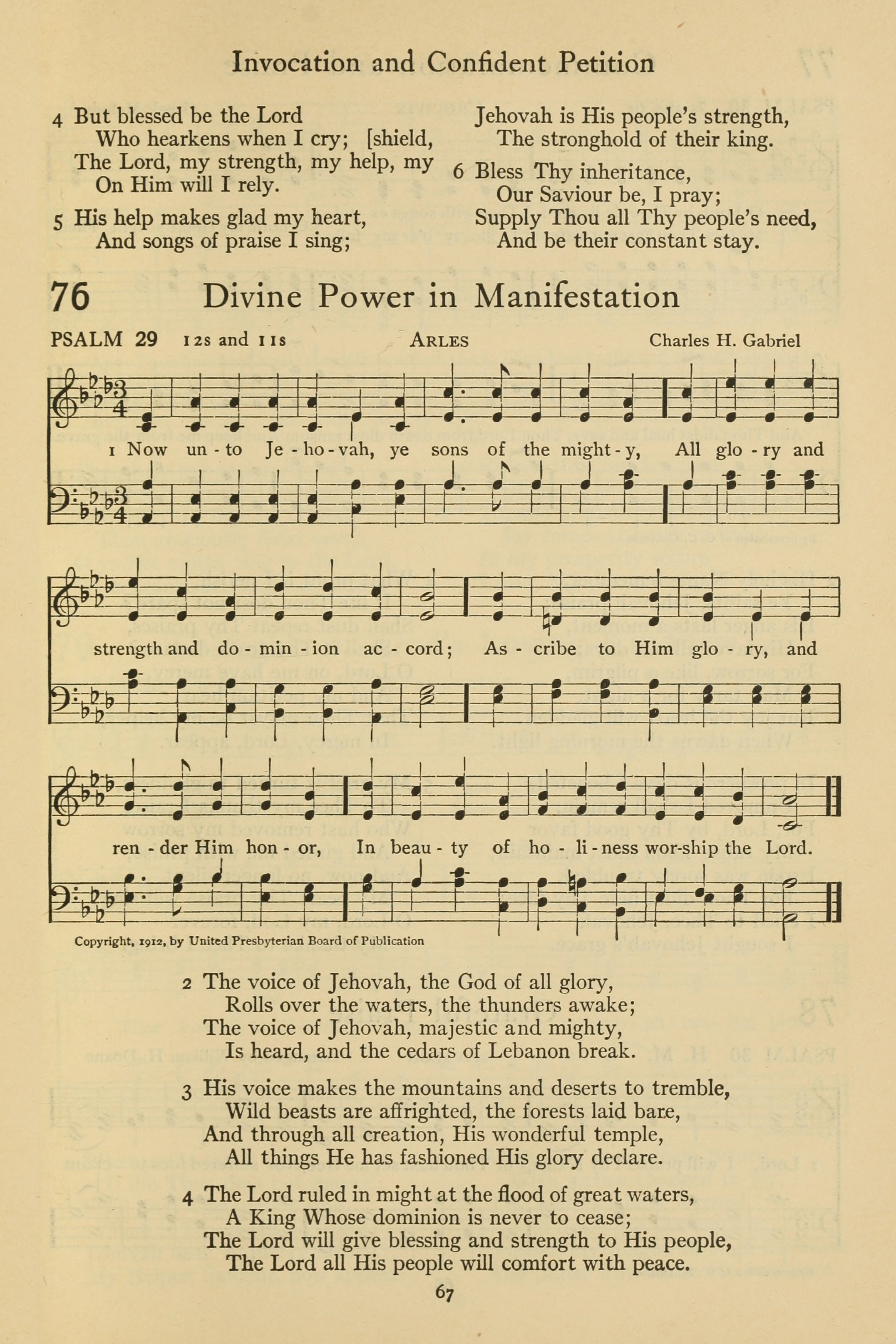Psalm 29
Give ye to Jehovah, O sons of the mighty
including
Now unto Jehovah, ye sons of the mighty
with
ROXBURGHE
FOREST-FIELD
ARLES
I. Text: Origins
This metrical paraphrase of Psalm 29 was made by Horatius Bonar (1808–1889) and first published in the Presbyterian Psalter and Hymn Book (London: James Nisbet, 1865), uncredited, text only, in six stanzas of four lines. At the time, Bonar was pastor of North Church in Kelso, Scotland.
Fig. 1. Presbyterian Psalter and Hymn Book (London: James Nisbet, 1865).
The following year, the hymn was included without change in Bonar’s Hymns of Faith and Hope, Third Series (London: James Nisbet, 1866 | Fig. 2).
Fig. 2. Hymns of Faith and Hope, Third Series (London: James Nisbet, 1866).
Also that year, from the same publisher as the previous two examples, the hymn was given in Psalms and Hymns for Divine Worship (London: James Nisbet, 1866 | Fig. 3), uncredited on the page but credited to Bonar in the index. Here it appeared with two tunes, FOREST-FIELD by W.H. Collcott and ROXBURGHE by Henry Smart (1813–1879). Smart’s tune was named after a small village and parish in Scotland, near Kelso.
Fig. 3. Psalms and Hymns for Divine Worship (London: James Nisbet, 1866).
In the United States, in the late 19th and early 20th centuries, Bonar’s paraphrase was often set to a tune by H.R. Palmer (1834–1907), from Palmer’s Book of Anthems (1879), but this tune has fallen out of use.
II. Text: Analysis
Bonar’s paraphrase hews closely to the original text. He embraced the repetitions in the Psalm and included them rather than trying to condense the text for brevity. The last line of stanza 2 is the most significant extrapolation, not a part of the Psalm. In place of YHWH, where the King James Version uses LORD, Bonar used the transliteration Jehovah, which in modern times is sometimes viewed as a troublesome practice and could be a cause for alteration. Also, his insertion of the word “sons” in the first line is ripe for substitution, the simplest choice being “heirs.” Congregationally or pastorally, the line “son of the unicorn Sirion” has an obscure meaning and would benefit from an explanation or from a more generalized paraphrase. Another potential language barrier is found in the line “The hind of the field into travail-pangs casteth,” meaning “the deer of the field he has sent into labor.”
III. Alterations
Bonar’s text was used as a model for a similar paraphrase of Psalm 29 made for the United Presbyterian Psalter (1872 | Fig. 4), beginning “Ye sons of the mighty, give ye to Jehovah” and set to a tune by R.B. Robertson, one of the editors of the collection. This is a faithful recasting of the Psalm text, built on Bonar’s choice of meter and making obvious reference to his text by the simple inversion of the first line. The approach to Sirion in stanza 3 is arguably more successful than Bonar’s, and “makes the hinds calve” is nearly a direct quote from the KJV while also being more concise. The editors were able to confine the material to five stanzas rather than Bonar’s six.
Fig. 4. The Psalter (Pittsburgh: United Presbyterian Board, 1872).
This paraphrase was repeated in editions of the United Presbyterian Bible Songs (1879, 1890, 1901), and in The Psalter (1887), with varying tunes. When the The Psalter was revised again in 1912, this paraphrase was reworked, thus beginning “Now unto Jehovah, ye sons of the mighty,” skillfully condensed into four stanzas, and set to a tune called ARLES by Charles H. Gabriel (1856–1932). In this Psalter, the copyright declarations under the music were for the tunes, so Gabriel evidently wrote this tune especially for this setting, and the copyright was claimed by the publisher.
Fig. 5. The Psalter (Pittsburgh: United Presbyterian Board, 1912).
Some more recent hymnals have used the tune KREMSER, a Dutch tune whose composer is unknown, first published with the song “Wilt heden Nu treden Voor God den Heere” in Neder-Landtsche Gedenck-Clank (1626), and later named after an influential arrangement of it by Eduard Kremser in 1877.
For a modern tune for these Psalm paraphrases, see “Now Unto Jehovah” by Gregory Wilbur from the album My Cry Ascends: New Parish Psalms (2010).
by CHRIS FENNER
for Hymnology Archive
9 February 2023



